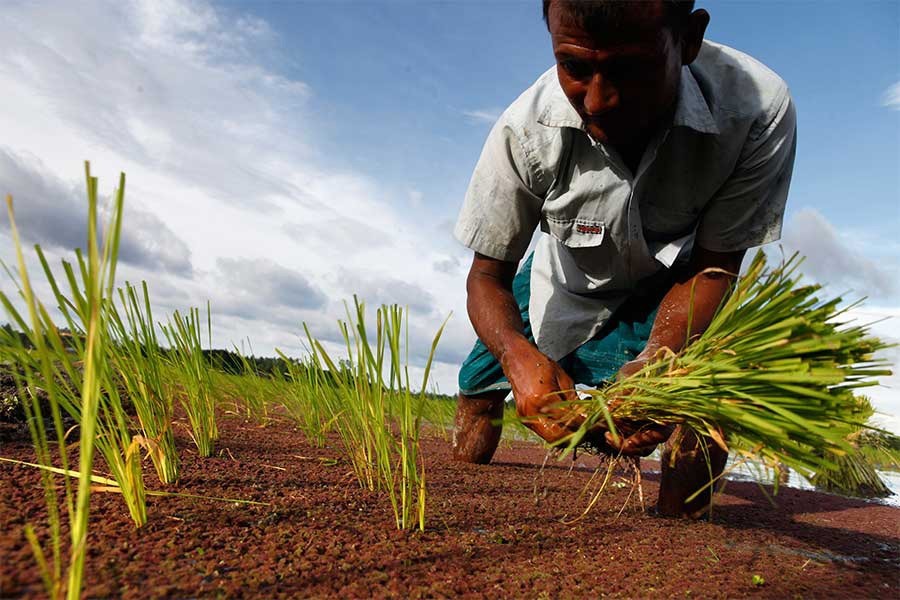‘Farmers to get machineries at subsidised rate from next season’

Published :
Updated :

Farmers will be provided with agricultural machinery at subsidiary rates in order to boost production and save them from losses, said Agriculture Minister Muhammad Abdur Razzaque.
The minister told it to UNB news agency in a recent interview adding that machineries like combine harvesters, rippers and rice transplanters will be provided at 60 per cent subsidised rates from the next Boro season under a project.
The Department of Agricultural Extension (DAE) has already prepared a proposal seeking a Tk 5.62 billion allocation for the project.
“Farm worker crisis has pushed up the production costs of farmers. It has been created due to alternative job opportunities. Now farmers don’t get workers when needed and they’ve to pay higher wages if they get ones, resulting in increased production costs. Agriculture mechanisation is necessary to face the crisis,” he said.
The minister said the mechanisation of farming is aimed at reducing the production cost and boosting productivity.
“Once it’s done, farmers will be able to prevent crop wastage and save their both money and time,’’ said Dr Razzaque adding that the project also aims to increase production by making farming more profitable and commercially viable.
Replying to a question about the quantity of required machineries, the minister said agriculture officials during a recent survey received detailed information from farmers to determine the needs of cutting and planting machines.
He said authorities will distribute these machineries as per requirement received through the survey from 58 districts.
Mentioning some obstacles to mechanisation of farming, the minister said the services of the machinery suppliers in the country are very poor and customers used to get deprived of after-sale services.
Besides, he said, spare parts of these machineries are not available in the country.
The authorities concerned have been directed to make sure that farmers get proper after-sales services for their machines after their purchase from suppliers.
To ensure transparency in purchasing machinery, a representative from the Bangladesh Bank will be placed in the subsidy coordination committee, he said adding that representatives from the Bangladesh Agricultural Development Corporation (BADC) will be included in the subsidy technical committee and the subsidy market rate verification committee.
During the last Boro season, farmers across the country was hit hard by low paddy prices and counted about Tk 300 loss per maund. Farmers in different parts of the country staged protests in different ways demanding fair prices of their produces.
Students of different universities, including Sher-e-Bangla Agricultural University and Rajshahi University, also joined the protest programmes.
Arranging food silos
Replying to a query about government steps to end deprivation of farmers due to the existence of middlemen, the agriculture minister said the government is working to ensure fair prices for their produces.
“We’ll take initiatives to construct an adequate number of food silos so that famers can preserve their produces.”
Pointing out that some middlemen are buying food grains from growers at lower prices, the minister said farmers would be more benefited if they could sell their produces in the market directly.
In some areas, he said, the growers sell their farm produces to middlemen at lower prices for lack of storage facilities and poor transport system.
‘’We’ll take steps at the grassroots level so that their produces can be preserved, enabling them to store their produces and have fair prices by selling those at a suitable time,” he said.
Commercialisation of agriculture
The government is now targeting commercialisation of agriculture, Dr Razzaque said adding, “To achieve the goal, farmers will be provided with all kinds of assistance alongside mechanisation of agriculture.”
Mentioning that farmers were deprived of fair prices in the last season, he said the government procured paddy directly from farmers and took initiatives for rice export to address the crisis.
‘’We’ll take action in advance to avoid the recurrence of such a situation in the future,” he added.


 For all latest news, follow The Financial Express Google News channel.
For all latest news, follow The Financial Express Google News channel.